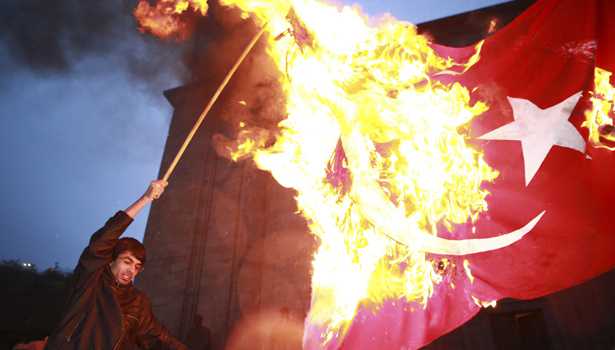In the Caucasus, culinary nationalism is an extension of the region’s long-simmering disputes.

A demonstrator sets fire to a Turkish flag as he attends a torch-bearing march marking the anniversary of the 1915 mass killings of Armenians in Ottoman Empire, in Yerevan on April 23, 2010. (Reuters)
There is perhaps nothing more closely bound up with one’s national identity than food. Specific local dishes are often seen as the embodiment of various cultures and many nations promote their food as a celebration of national identity. Sometimes, however, a country’s cuisine can also be used to highlight national rivalries.
Czechs, for example, sometimes affectionately (some would say condescendingly) refer to their Slovak cousins as “Halusky” after the typical gnocchi dish that comprises part of their national cuisine. Similarly, the English often disparagingly call their French neighbors “Frogs” because of the Gallic penchant for eating the legs of said amphibians.
Culinary flashpoints can also arise when neighboring nations all lay claim to the same regional dish. For instance, the Scots, English, and the Irish often bicker about whose fried breakfast is the original and the best of the species.
In the volatile Caucasus region, though, it seems that such food fights have now been taken to a whole new level. As Eurasianet.org reports, many Armenians are up in arms about a recent UNESCO decision to add the Anatolian stew “Keshkek” to its Intangible Cultural Heritage List on behalf of Turkey. They claim that “Keshkek” is actually an Armenian meal, which they call “Harissa.”
Now a group of ethnographers from Turkey’s eastern neighbor are actually compiling information on the dish to appeal the ruling by the UN’s cultural agency.
According to the News.am website, Sedrak Mamulyan, the chairman of the “Development and Preservation of Armenian Culinary Traditions” organization, is intent on demonstrating that “the utensils, methods, and ingredients used for making…Harissa have a pure Armenian origin and it is a purely Armenian dish.” The same organization has also attacked Georgia for commandeering “Khash.” It insists that this tasty beef soup is in fact an Armenian national dish.
Armenia, meanwhile, has itself come under fire from Azerbaijan, which has accused its neighbor and regional nemesis of “cuisine plagiarism.” Baku’s National Security Ministry has even set up a National Cuisine Center to reinforce its claim to the nation’s cuisine and, in particular, to help counter any Armenian efforts to appropriate what it feels are Azerbaijani dishes.
The “Tolma” dish, which consists of meatballs wrapped in grape leaves, seems to be a particular bone of contention between the two countries, especially since Azerbaijani President Ilham Aliyev publicly announced last year that it was an Azeri national dish.
This provoked a furious response in Armenia and various initiatives have been launched to help save the country’s national dishes from “occupants.” This even includes holding an annual Tolma Festival to reinforce the idea that it is a typically Armenian food.
Whatever the upshot of these culinary claims and counterclaims, it sadly doesn’t seem like these regional rivals will be sitting down to break bread with each other anytime soon.
This post appears courtesy of Radio Free Europe/Radio Liberty.
via Knives Out: Turkey’s and Armenia’s War Over Food – Coilin O’Connor – The Atlantic.
